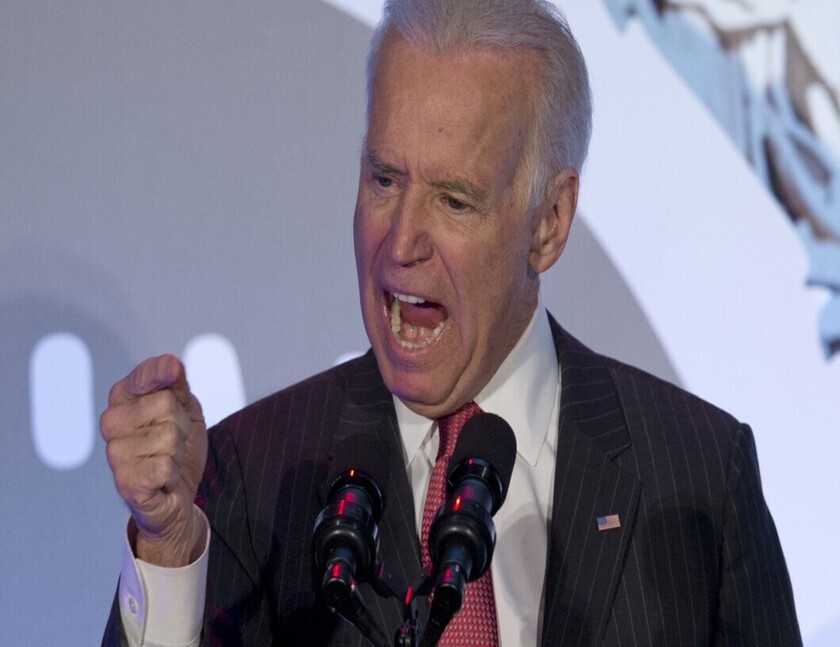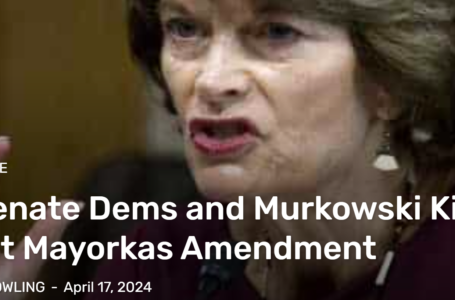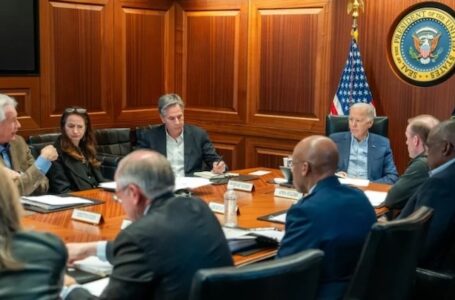New Nuclear Deal Would Empower the Iranian Regime

BIDEN’S WORLD
by Hany Ghoraba
IPT News
July 21, 2021
The current, bumpy negotiations aimed at preventing the Iranian regime from developing nuclear weapons are among the Biden administration’s highest priorities. The administration lifted sanctions on more than a dozen former Iranian officials in June, a move that Iranian officials viewed as a victory.
Iran even claimed that 1,000 more sanctions will soon be lifted, which the U.S. State Department spokesman denied. Days later, it was reported that the Biden administration might remove what it considers symbolic sanctions on Iranian Supreme Leader Ali Khamenei.
The relief comes as Iran faces new internal pressures. Severe water shortages have triggered six days of massive anti-government protests, including chants of “Death to [Ayatollah] Khamenei.”
As diplomacy continues, Iran is not relenting in pursuing its violent objectives. U.S. troops in Syria were shelled by Iranian rocket fire following U.S. airstrikes on Iranian-backed militias. While U.S. forces responded to the attacks, it was not enough to stop six reprisal attacks by Iranian-backed militias in Iraq and Syria this month alone. “President Biden must put forward a real strategy for deterring and ending these attacks, rather than continuing his bare-minimum, tit-for-tat approach that is failing to deter Iran or its militias and puts American lives at increased risk.” said U.S. Sen. Jim Inhofe, R-Okla.
Iran’s Supreme National Security Council on Tuesday rejected a new draft nuclear agreement because it was incompatible with legislation passed by Iran’s parliament last December. That law prohibits the country from dropping below 20 percent enriched uranium, which would not be allowed in any negotiated nuclear deal.
“The committee formed at the SNSC which was responsible for comparing the draft with the law passed by the parliament in December has decided that it is incompatible with the law,” said Ali Rabiei, spokesman for outgoing Iranian President Ali Rouhani.
In 2015, Iran signed the Joint Comprehensive Plan of Action (JCPOA) with the United States, France, the United Kingdom, China, Russia and Germany. It lifted some sanctions on the Iranian government in exchange for restricting the amount of enriched uranium stockpiles Iran could maintain.
Since then, Iran ratcheted up its expansionist plans in the Middle East, underwriting terrorist groups and even assassinating dissidents in Western countries.
Those aggressive international terrorist operations continue. Four Iranian nationals were charged in New York July 14 with attempting to kidnap American journalist Masih Alinejad and take her to Iran. The plot began in 2018, the indictment says. Alinejad is a critic of the tyrannical Iranian regime. The plot was foiled by the FBI.
Iranian state agents reportedly are intensifying social media campaigns to sow discord among Americans, pushing anti-Semitic messages such as “Hitler was right,” and “kill all Jews.”
The 2015 JCPOA clearly benefited Iran, freeing up money to expand its Middle East hegemony.
In Lebanon, Hizballah continues to use force to expand its influence on the state politics. Backed by $700 million in annual Iranian financing, Hizballah has become Lebanon’s most influential political player.
In Iraq, the Popular Mobilization Forces PMF, which was allegedly formed to curb ISIS’s rapid expansion in 2014, has become an Iranian proxy, committing atrocities and assassinating citizens. Iraqi authorities arrested PMF commander Qasem Muslah in May, charging him in connection with the assassinations of pro-democracy activists.
Since winning election as Iran’s new president last month, hardliner Ebrahim Raisi has said that he will not negotiate over Iran’s missile program or meet with Biden, even if both sides agreed on terms to revive the JCPOA. No one has proposed such a meeting, but it is a sign that Iran’s hardline policies are not going to change.
Raisi also told a news conference that “Saudi Arabia and its allies should immediately stop their interference in Yemen,” but said nothing about withdrawing its financial and military support for the Houthis. The Houthis are Shia rebels who seized Yemen’s capital in 2014, prompting Saudi Arabia to intervene in support of the Yemeni government and army.
Houthi rebels can reach Saudi cities and targets by ballistic missiles and drones, as evidenced by the April drone attack targeting the King Khalid air base and Saudi oil company Aramco.
The fighting in Yemen has killed more than 230,000 people and sparked a humanitarian crisis.
While Iran’s economy struggles, its support for terrorist groups continues. Despite May’s Gaza war, Hamas has enough Iranian money to continue its operations, said Hamas chief Yahya Sinwar. “All the thanks to the Islamic Republic of Iran, which never spared any expenses on us or other Palestinian factions, Sinwar said in a May 30 news conference. “They provided us with money, arms and expertise.” Hamas will “scorch the earth,” he threatened, if Gaza’s problems are not solved.
Threats of annihilation are consistent with Hamas’s founding charter. But they also match Iran’s repeated goal. Former Iranian President Mahmoud Ahmadinejad described Israel in 2005 as “disgraceful blot” that should be “wiped off the face of the earth.”
In 2017, Iranian authorities installed a doomsday clock, ticking toward 2040, the year Supreme Leader Ali Khamenei predicted Israel would be destroyed. But in a sign of Iran’s misplaced priorities, the clock stopped working earlier this month due to power shortages in the country.
“Our strategy is to erase Israel from the global political map. And it seems that, considering the evil that Israel is doing, it is bringing itself closer to that,” Brigadier General Hossein Salami said in 2019.
The JCPOA enabled Iran, one of the world’s biggest oil exporters, to expand its sales. But those exports dropped from 2.5 million barrels per day to 2 million barrels after the U.S. withdrew from the deal in 2018. Iranian exports increased significantly recently despite the current sanctions, and are poised to increase further if the sanctions are lifted.
“We set the highest record of exports of refined products in the history of the oil industry during the embargo period,” said Iranian oil minister Bijan Zangeneh. “If the sanctions are lifted, we will return to the market stronger than before, and faster than expected.”
In the meantime, Iran is closer to producing its first nuclear bomb now. The State Department announced last week that it would waive sanctions on billions of dollars in Iranian oil trade so the Islamic Republic could “transfer of Iranian funds in restricted accounts to exporters in Japan and the Republic of Korea.”
For the past six months, the Biden administration has been sending messages that it intends to deescalate the situation with Iran, but Iranian officials interpret them as a sign of weakness. Iranian Revolutionary Guard intelligence chief Hussein Taeb last week urged an escalation in attacks against U.S. forces in Iraq.
“History has repeatedly proven that appeasement will only embolden and empower a rogue state. But the Biden administration and the EU appear determined to pursue this dangerous policy with a regime that is a top state sponsor of terrorism, according to the US State Department, and a leading human rights violator,” wrote Iranian-American political scientist Majid Rafizadeh in the Arab News.
Reports indicate the Biden administration is trying to wrap up the deal before Raisi takes office next month. Once he’s in, the thinking goes, chances for any agreement plummet.
“Khamenei’s objective for installing Raisi is to confront popular uprisings and to gain the latitude he needs for the nuclear and missile programs, as well as for regional warmongering,” said Iranian opposition leader Maryam Rajavi July 10 at the annual Free Iran World Summit.
Iran is technically capable of enriching uranium to weapons-grade should it choose so, said outgoing Iranian President Hassan Rouhani. After six rounds of talks in Vienna, an agreement still seems far away.
In spite of President Biden’s declaration that Iran will not acquire nuclear weapons on his watch, it is becoming clearer that the current U.S. administration has no tangible plan to counter or deal with the Iranian threat to the Middle East and U.S. interests in it, and is simply improvising. Accordingly, if the Iranian regime is capable of creating all the above mentioned havoc while still under U.S. sanctions, how much worse will it behave when these are sanctions lifted?
IPT Senior Fellow Hany Ghoraba is an Egyptian writer, political and counter-terrorism analyst at Al Ahram Weekly, author of Egypt’s Arab Spring: The Long and Winding Road to Democracy and a regular contributor to the BBC.
##
















